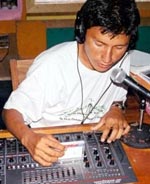Remote village in Suriname sends first email
13-12-2005 (Paramaribo/Kingston)

A few weeks ago, people of the Amerindian village of Galibi, a small Carib indigenous community at the border of Suriname and French Guyana, finally got their own Community Multimedia Centre.
The center has been created as part of UNESCO’s Community Multimedia Centre (CMC) programme, which involves the setting up community media centres in rural and remote communities that would not normally have access to computers, the Internet and all opportunities that are available through these new media.
The centre is linked to Radio Galibi, the local community radio station, where volunteers from the community have helped to broadcast news and information in their own Carib language Kali’na to 23 indigenous villages both in Suriname and French Guyana.
The Galibi CMC is one of the 21 media centres supported by UNESCO within the Caribbean CMC network and is a part of the Suriname National Network of Community Multimedia Centres.
In addition to the technical set up of the computers, the centre was connected to the Internet through high speed VSAT technology. A training programme has started by Suriname Education and Communication Network (EDUCONS), a local NGO. Community members are guided in how to use the computers for basic information literacy like emailing and Internet, development of multimedia, digital broadcasting as well as websites development for purposes of preservation and propagation of culture, promotion of ecotourism and e-commerce. Some volunteers of the radio station are also learning how to do technical maintenance of hardware and software.
One of the Carib Chiefs was the first to send an email from his village that was addressed to one of the trainers of EDUCONS in Paramaribo, the capital city of Suriname. “This is a dream that became reality,“ he and one of the village youth representatives wrote in another mail to the UNESCO project officer acknowledging UNESCO’s support. “At last,” they wrote,” an organization had more than just words and promises to offer.”
Like many other rural and remote areas the village is faced with the challenge of shortage of power supply, but the centre uses a combination of wind, generator and solar power. It has received a small diesel generator to be used during training sessions and will be open during night time when the village generator is turned on.
In a regional workshop organized by UNESCO, with the theme “ICT for sustainable development of rural and marginalized Communities”, held this October in Paramaribo, Suriname - the challenge of power shortage was one of the topics discussed. UNESCO and other international and local partners are now exploring other means of renewable energy to assist Galibi and other remote communities in the region.
The centre is linked to Radio Galibi, the local community radio station, where volunteers from the community have helped to broadcast news and information in their own Carib language Kali’na to 23 indigenous villages both in Suriname and French Guyana.
The Galibi CMC is one of the 21 media centres supported by UNESCO within the Caribbean CMC network and is a part of the Suriname National Network of Community Multimedia Centres.
In addition to the technical set up of the computers, the centre was connected to the Internet through high speed VSAT technology. A training programme has started by Suriname Education and Communication Network (EDUCONS), a local NGO. Community members are guided in how to use the computers for basic information literacy like emailing and Internet, development of multimedia, digital broadcasting as well as websites development for purposes of preservation and propagation of culture, promotion of ecotourism and e-commerce. Some volunteers of the radio station are also learning how to do technical maintenance of hardware and software.
One of the Carib Chiefs was the first to send an email from his village that was addressed to one of the trainers of EDUCONS in Paramaribo, the capital city of Suriname. “This is a dream that became reality,“ he and one of the village youth representatives wrote in another mail to the UNESCO project officer acknowledging UNESCO’s support. “At last,” they wrote,” an organization had more than just words and promises to offer.”
Like many other rural and remote areas the village is faced with the challenge of shortage of power supply, but the centre uses a combination of wind, generator and solar power. It has received a small diesel generator to be used during training sessions and will be open during night time when the village generator is turned on.
In a regional workshop organized by UNESCO, with the theme “ICT for sustainable development of rural and marginalized Communities”, held this October in Paramaribo, Suriname - the challenge of power shortage was one of the topics discussed. UNESCO and other international and local partners are now exploring other means of renewable energy to assist Galibi and other remote communities in the region.
Related themes/countries
· Suriname
· News Archives 2005
Share this story:
Contact information
- UNESCO
Source














